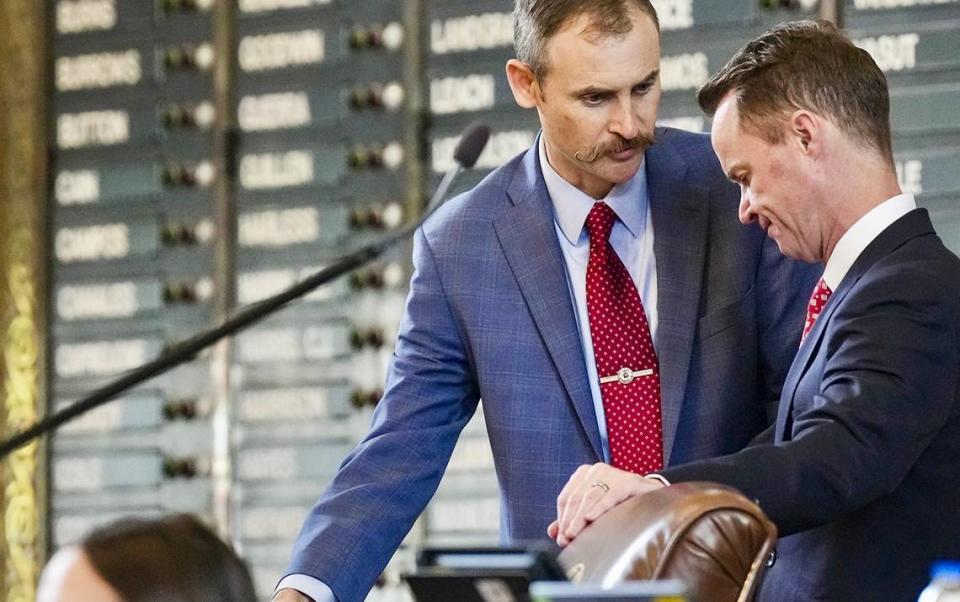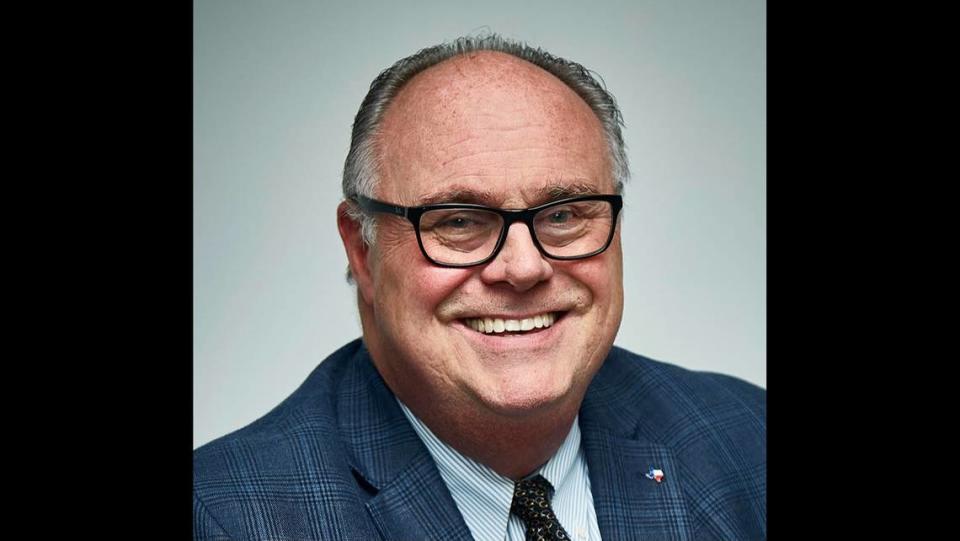Mark Davis: Republicans feel heat from conservative voters over rush to impeach Paxton | Opinion
- Oops!Something went wrong.Please try again later.
As the hot Texas summer of 2023 unfolds, additional heat will surround the high-stakes impeachment drama that will unfold in Austin when the Senate weighs the fate of Attorney General Ken Paxton.
Paxton will either survive politically or not. Senators will have to assess whether they should base their vote on how the trial unfolds or what their voters want, factors that may diverge. And the 60 Republican House members who voted to impeach will wonder how that vote will affect them in primaries a little more than eight months away.
Dramatic lines are already drawn. Democratic voters dispirited by Paxton’s easy re-election last year are giddy at the prospect of his derailment. Just as every House Democrat voted to impeach, all 12 Senate Democrats will surely vote to convict.Conservative public support for Paxton seems mostly unbowed, but the House Republicans voting for impeachment included many who have consistently supported him, even through these last few years of scandals and clouds.
For all of the wheels turning in various courthouses, punctuated by four attorneys sufficiently repelled to file suit against Paxton for various assertions of corruption, nothing has come to trial. The FBI probe into the whistleblowers’ complaints has yielded no charges.
The articles of impeachment hastily cobbled together by a House committee borrow heavily from these unproven allegations that have hovered over the voting public, which spoke definitively just seven months ago in handing him a margin of victory similar to Gov. Greg Abbott’s blowout of Beto O’Rourke. Many Paxton supporters view the impeachment effort as an attempt to nullify that result.
But what drove the vast majority of Republican House members to join Democrats in the impeachment vote?
In replies to their own irate voters, the reasoning follows a pattern: Paxton has delivered great results, they say, but the charges in the impeachment articles were sufficiently stunning to cry out for impeachment.
Really?
What new information is contained in those 20 counts that would turn a Paxton supporter into an impeachment advocate?
Claims of uniquely shocking new information are undercut by the acknowledgment from the House managers and their Republican allies that the impeachment fires were lit by the February court settlement deal reached between Paxton and the whistleblowers.
Paxton considered the settlement a state expense that would save money compared to the potential cost of years of protracted litigation. House Speaker Dade Phelan objected strongly, sparking a valid debate over who should pay the $3.3 million agreed to by all parties.
But this launched the impeachment investigation? By definition, this means the years of controversies swirling around Paxton were not sufficient to compel such scrutiny; it took a tug-of-war over dollars to prod a committee’s curiosities to the point of putting Paxton’s head on a block.

Impeachment-hungry Republicans are feeling heat from voters for their hastily cultivated hostility toward the attorney general. One would think their best optics would be to appear solemnly distant from the personal and political grudges woven through this episode. Yet in a newspaper column designed to quell Republican voter anger, lead impeachment manager Rep. Andrew Murr, R-Junction, repeated the admission that no investigative urge existed before the settlement, which he maligned as “a request for hush money” by Paxton.
A conscious decision to smear one side of a court-approved mutual agreement is precisely the kind of venom that fuels the belief that this is a political hit.
There is no evidence that any members of the GOP impeachment brigade represent voters who wanted Paxton impeached. They curated this passion independently and are now energetically spinning that the impeachment articles themselves gave them no choice.
Of course they had a choice. Twenty-three other Republicans found otherwise and voted “no.” Some in that contingent are painting a picture of an intra-party vendetta populated with GOP moderates who bristle at Paxton’s conservatism, joined with fellow travelers currying favor with Phelan by putting Paxton into a career guillotine.
One key Republican impeachment supporter rejects the Phelan blood feud narrative, telling me: “Dade never talked to any of us about it.” Direct lobbying is not always necessary; sometimes you just know what the boss wants.
On @MarkDavis show this morning, @DanPatrick addressed calls for Senate to just “dismiss” Paxton impeachment:
“We actually have to address the issues. If not, they could keep Ken Paxton away from doing his job forever. … In general, we have to deal with it.” #txlege— Patrick Svitek (@PatrickSvitek) June 19, 2023
What Paxton’s attorneys want is for the Senate to dismiss the articles summarily, finding them insufficient for the time and energy of a trial. That appeared less likely this week as Lt. Gov. Dan Patrick, who will preside over the Senate proceeding, told me: “In general, we have to deal with it. … We actually have to address the issues.”
When they do, are there nine Senate Republicans who will join the dozen Democrats to reach the two-thirds bar of 21 needed to convict? As in the House, not one of them was elevated to office by voters who now want Paxton ousted. So is that their beacon, or will the trial supply such damning evidence that minds are changed among those senators and their voters?
Impeachments are political, not judicial. Senators may call on whatever logic they wish, leaning on evidence presented, the mood of the electorate today and possible consequences in the primaries if a vote to impeach is not popular. The 60 House members voting for impeachment are already planning to soothe voter wrath with campaigns filled with reminders of the conservative successes of the session.
While many Republicans in the House have been speaking at length about their votes for or against impeachment, senators have been uniformly silent, aware of the delicacy of their role as jurors. But soon, they will speak through their votes. They may not share the priorities that guided them, but voters will immediately make their reactions clear.
Mark Davis hosts a morning radio show in Dallas-Fort Worth on 660-AM and at 660amtheanswer.com. Follow him on Twitter: @markdavis.


